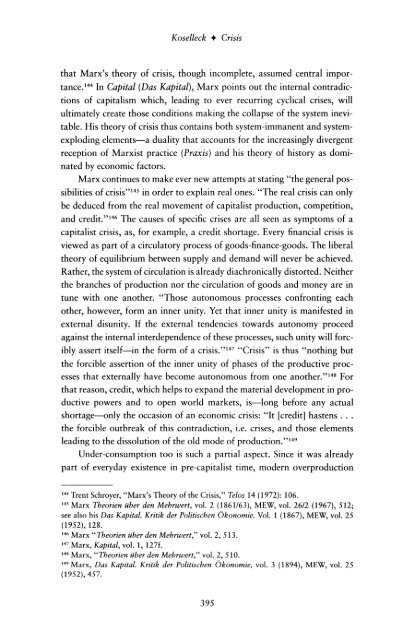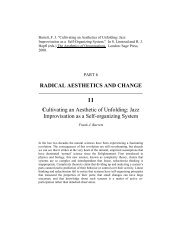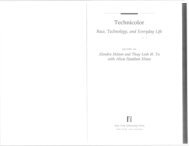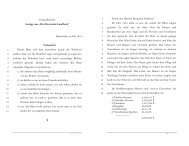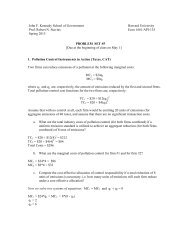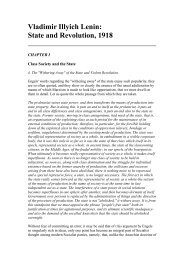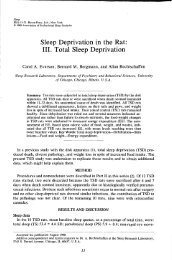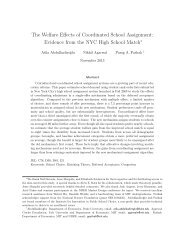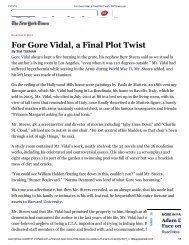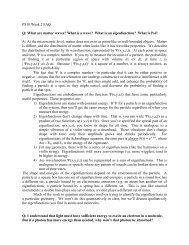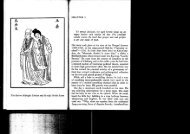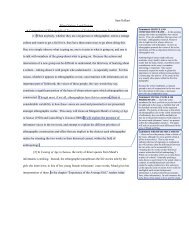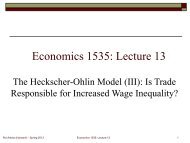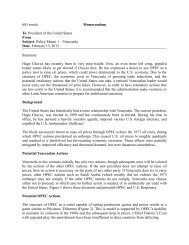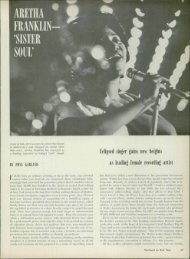CUisis AuthoU(s): ReinhaUt Koselleck and Michaela W ... - iSites
CUisis AuthoU(s): ReinhaUt Koselleck and Michaela W ... - iSites
CUisis AuthoU(s): ReinhaUt Koselleck and Michaela W ... - iSites
You also want an ePaper? Increase the reach of your titles
YUMPU automatically turns print PDFs into web optimized ePapers that Google loves.
<strong>Koselleck</strong> + Crisis<br />
that Marx's theory of crisis, though incomplete, assumed central importance.144<br />
In Capital (Das Kapital), Marx points out the internal contradictions<br />
of capitalism which, leading to ever recurring cyclical crises, will<br />
ultimately create those conditions making the collapse of the system inevitable.<br />
His theory of crisis thus contains both system-immanent <strong>and</strong> systemexploding<br />
elements-a duality that accounts for the increasingly divergent<br />
reception of Marxist practice (Praxis) <strong>and</strong> his theory of history as dominated<br />
by economic factors.<br />
Marx continues to make ever new attempts at stating "the general possibilities<br />
of crisis"145 in order to explain real ones. "The real crisis can only<br />
be deduced from the real movement of capitalist production, competition,<br />
<strong>and</strong> credit."146 The causes of specific crises are all seen as symptoms of a<br />
capitalist crisis, as, for example, a credit shortage. Every financial crisis is<br />
viewed as part of a circulatory process of goods-finance-goods. The liberal<br />
theory of equilibrium between supply <strong>and</strong> dem<strong>and</strong> will never be achieved.<br />
Rather, the system of circulation is already diachronically distorted. Neither<br />
the branches of production nor the circulation of goods <strong>and</strong> money are in<br />
tune with one another. "Those autonomous processes confronting each<br />
other, however, form an inner unity. Yet that inner unity is manifested in<br />
external disunity. If the external tendencies towards autonomy proceed<br />
against the internal interdependence of these processes, such unity will forcibly<br />
assert itself-in the form of a crisis."147 "Crisis" is thus "nothing but<br />
the forcible assertion of the inner unity of phases of the productive processes<br />
that externally have become autonomous from one another."148 For<br />
that reason, credit, which helps to exp<strong>and</strong> the material development in productive<br />
powers <strong>and</strong> to open world markets, is-long before any actual<br />
shortage-only the occasion of an economic crisis: "It [credit] hastens ...<br />
the forcible outbreak of this contradiction, i.e. crises, <strong>and</strong> those elements<br />
leading to the dissolution of the old mode of production."'49<br />
Under-consumption too is such a partial aspect. Since it was already<br />
part of everyday existence in pre-capitalist time, modern overproduction<br />
144 Trent Schroyer, "Marx's Theory of the Crisis," Telos 14 (1972): 106.<br />
145 Marx Theorien iber den Mehrwert, vol. 2 (1861/63), MEW, vol. 26/2 (1967), 512;<br />
see also his Das Kapital. Kritik der Politischen Okonomie. Vol. 1 (1867), MEW, vol. 25<br />
(1952), 128.<br />
146 Marx "Theorien ber den Mehrwert," vol. 2, 513.<br />
1'47 Marx, Kapital, vol. 1, 127f.<br />
148 Marx, "Theorien iiber den Mehrwert," vol. 2, 510.<br />
149 Marx, Das Kapital. Kritik der Politischen Okonomie, vol. 3 (1894), MEW, vol. 25<br />
(1952), 457.<br />
395


